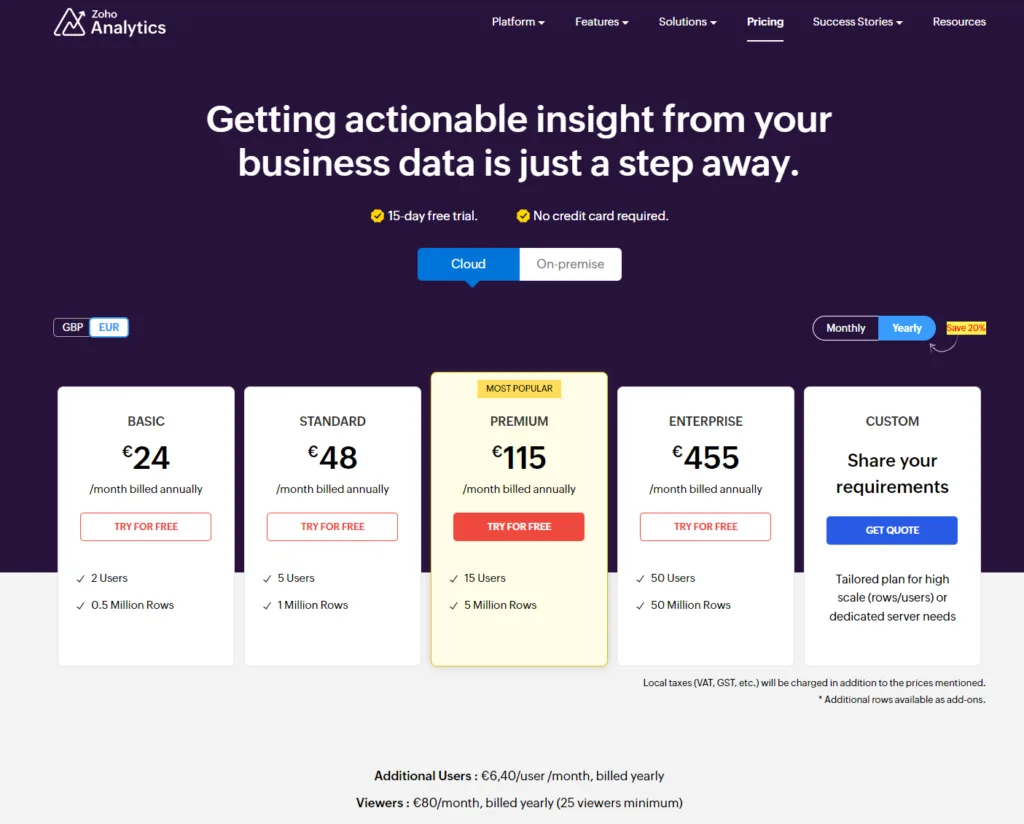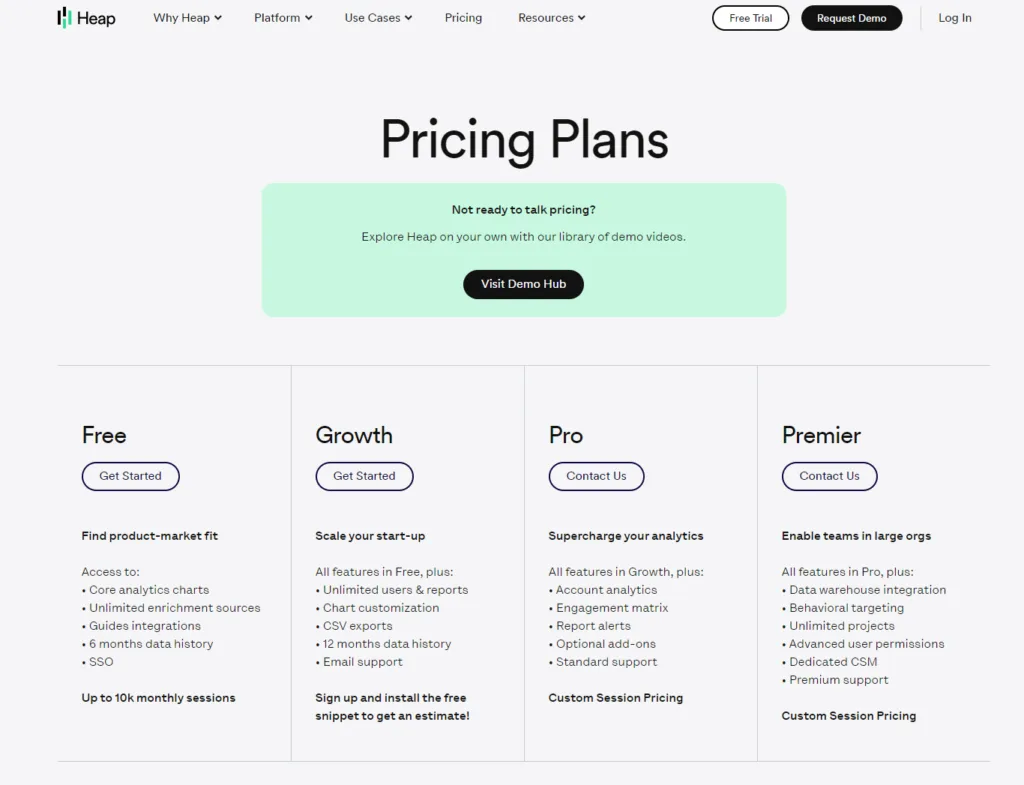In the digital realm, where data is both the map and compass for navigating business strategy, choosing the right analytics tool is akin to selecting a trusted guide for an expedition. Among the plethora of options, Zoho Analytics and Heap emerge as two prominent landmarks, each offering unique vantage points to view and interpret the landscape of your data. Zoho Analytics, with its comprehensive suite, promises a bird’s-eye view of your business metrics, while Heap focuses on the granular, offering deep dives into user interactions. The quest is not just about which tool shines brighter but which one aligns perfectly with your journey. Will it be the versatile expanses of Zoho Analytics or the intricate depths of Heap? Let’s embark on this exploration to discover “The Best Analytics Tool for You.”
| Zoho Analytics | Heap |
|---|---|
 |  |
| G2 Score -4.3 out of 5 | G2 Score -4.4 out of 5 |
| TrustRadius Score -8.1 out of 10 | TrustRadius Score -8.2 out of 10 |
Area of Comparison: User Behavior and Event Tracking
At the heart of any analytics tool lies its ability to decode user behavior and track events, offering insights that drive decision-making and strategy. Let’s dissect how Zoho Analytics and Heap tackle this pivotal aspect.
Zoho Analytics: The Broad Spectrum Analyst
Zoho Analytics is akin to an all-seeing oracle, offering businesses the power to monitor a wide array of metrics from sales performance, marketing effectiveness, to operational efficiency. Its user behavior and event tracking capabilities, though not its sole focus, form an integral part of its extensive suite. Zoho allows for the integration of data from various sources, including web and mobile analytics, CRM systems, and more, enabling a holistic view of user interactions across different platforms.
The platform offers customizable dashboards and reports, which can be tailored to track specific user actions and events, albeit with a bit of setup. Zoho Analytics shines in providing a macro-level understanding of user behavior, ideal for businesses looking for an analytics tool that covers a broad operational spectrum.
Heap: The Micro-Level Interaction Explorer
Heap, by contrast, specializes in capturing every nuance of user interaction with your website or application. It automatically tracks every click, form submission, page view, and more, right out of the box, without requiring users to define events upfront. This approach ensures no data is missed, offering a comprehensive dataset from which to derive insights.
Heap’s strength lies in its ability to provide detailed analyses of user behavior, funnel performance, and user journeys. Its interface allows businesses to easily segment users, analyze individual interactions, and perform cohort analysis, making it a powerful tool for optimizing user experience and conversion rates.
Pricing: Understanding the Investment in Analytics
Continuing our comparison between Zoho Analytics and Heap, we now turn our attention to Pricing, a critical factor for any business considering an analytics tool. The pricing structure of an analytics platform not only influences immediate budgeting decisions but also reflects the tool’s overall value proposition based on its features, scalability, and support offerings.
Zoho Analytics: Transparent and Tiered Pricing

Zoho Analytics adopts a transparent and tiered pricing model, designed to accommodate businesses of various sizes and analytics needs. It offers a range of plans, starting from a basic free tier, which provides users with access to essential analytics capabilities suitable for small projects or individual users. As businesses require more advanced features, higher data capacity, or increased user access, Zoho Analytics provides several premium plans to choose from.
These premium plans are structured to scale with the growing needs of a business, offering more in-depth analytics, greater data integration options, and enhanced collaboration features. The clear delineation of features and limits in each tier helps businesses predict their investment as they scale their use of analytics, ensuring they can access the necessary tools without overspending.
Heap: Custom Pricing for Tailored Needs

Heap, focusing on user behavior analytics and optimization, offers custom pricing to its users. This approach allows Heap to tailor its pricing based on the specific needs, scale, and usage patterns of a business. While custom pricing can offer flexibility and ensure businesses only pay for what they need, it requires direct engagement with Heap’s sales team to obtain pricing details and negotiate a plan.
Custom pricing models are particularly common among analytics platforms that offer deep, specialized insights, as they can vary significantly in how businesses utilize them. For Heap, this means aligning the cost with the value provided, especially for companies that rely heavily on detailed user interaction data to drive product development and marketing strategies.
Data Integration Capabilities: The Bridge Between Data and Decisions
Expanding on our comparison between Zoho Analytics and Heap, let’s explore another critical aspect that businesses must consider when selecting their ideal analytics tool: Data Integration Capabilities. The ability to seamlessly blend data from a myriad of sources into a cohesive, actionable insight is paramount in today’s data-driven landscape.
Zoho Analytics: The Versatile Integrator
Zoho Analytics distinguishes itself with its extensive data integration capabilities, designed to accommodate a wide array of data sources — from cloud storage services like Google Drive and Dropbox to databases such as MySQL, along with numerous other business applications including Salesforce, Google Analytics, and social media platforms. This versatility ensures that Zoho Analytics can serve as a central hub for all your data analysis needs, providing a comprehensive view of your business operations across various departments and tools.
Furthermore, Zoho Analytics automates the synchronization process, ensuring that your data is consistently up-to-date. This automation, combined with the platform’s ability to perform complex data transformations, empowers businesses to create a unified data ecosystem that enhances the accuracy and relevancy of their analytics.
Heap: The Focused Pathfinder
While Heap might not boast the broad integration spectrum of Zoho Analytics, it excels in providing deep, seamless integrations with key platforms that impact user behavior analytics, particularly for web and mobile applications. Heap integrates effortlessly with tools critical for SaaS businesses and e-commerce platforms, such as Shopify, Salesforce, and various marketing automation and customer support tools, ensuring that user interaction data is comprehensively captured and analyzed.
Heap’s focus on automatically tracking every user action allows it to gather a rich dataset without the need for manual event tracking setup. This capability, when combined with its targeted integrations, makes Heap uniquely powerful in analyzing user behavior and optimizing user journeys based on actual interaction data.

Related: Check out our free SEO suite

Advanced Analytics Features: Unlocking Deeper Insights
This aspect is crucial for businesses aiming to not just understand past performance but also predict future trends, uncover deep insights, and make data-driven decisions that can significantly impact growth and competitiveness.
Zoho Analytics: The Comprehensive Analyst
Zoho Analytics offers a rich set of advanced analytics features that cater to a wide range of business intelligence needs. Its capabilities extend beyond basic reporting and dashboards to include predictive analytics, AI-powered insights with its intelligent assistant Zia, and sophisticated data blending techniques. Zoho Analytics enables users to forecast trends, perform what-if analyses, and derive actionable insights through its intuitive interface and powerful backend.
Additionally, Zoho Analytics supports SQL (Structured Query Language) for complex data querying, allowing users with technical expertise to dive deeper into their data. This blend of user-friendly and advanced technical features makes Zoho Analytics a versatile tool that can satisfy the needs of business users and data analysts alike.
Heap: The User Behavior Specialist
Heap focuses its advanced analytics features on understanding user behavior and optimizing product and website experiences. While it may not offer the broad spectrum of advanced analytics capabilities found in Zoho Analytics, Heap excels in providing detailed insights into how users interact with your product or website. Its automatic event tracking eliminates the need for manual setup, ensuring that every interaction is captured for analysis.
Heap’s advanced features include funnel analysis, cohort analysis, and retention tracking, which are invaluable for businesses looking to enhance user engagement, reduce churn, and increase conversions. These focused analytics capabilities are designed to offer deep insights into user behavior patterns, enabling businesses to make data-driven decisions that directly impact product strategy and user experience.
Integration Capabilities: Expanding Your Data Universe
As we continue to compare Zoho Analytics and Heap, focusing on Integration Capabilities becomes essential. The extent to which an analytics tool can seamlessly integrate with other systems and platforms is a significant determinant of its flexibility, the richness of insights it can provide, and ultimately, its value to your business.
Zoho Analytics: The Extensive Integrator
Zoho Analytics stands out for its wide-ranging integration capabilities, designed to pull data from a diverse set of sources. Being part of the Zoho ecosystem, it naturally integrates with other Zoho apps, such as Zoho CRM, Zoho Books, and Zoho Projects, enabling a smooth flow of data across various business functions. Beyond its ecosystem, Zoho Analytics offers connectors for dozens of popular third-party services, including Google Analytics, Salesforce, QuickBooks, and many more, facilitating a comprehensive view of your business data.
Moreover, Zoho Analytics supports generic connectors like APIs and webhooks, and it can import data from various file types, such as CSV, XLS, and JSON, allowing for custom integrations that cater to unique business needs. This capability ensures that businesses can consolidate and analyze data from virtually any source, making Zoho Analytics a powerful tool for those who rely on multiple platforms to run their operations.
Heap: The User-Focused Integrator
Heap focuses its integration efforts on platforms that directly impact user behavior analysis, particularly for digital products and e-commerce. It offers seamless integration with a variety of tools that are essential for understanding and optimizing the user experience, including A/B testing platforms, email marketing tools, customer support software, and e-commerce systems like Shopify.
While Heap’s range of third-party integrations might seem more focused compared to Zoho Analytics, its selection is deliberately curated to enhance its core offering of in-depth user interaction data. Heap also provides APIs for custom data tracking, ensuring that businesses can tailor their analytics setup to capture the specific user actions that matter most to them.
Conclusion
In wrapping up our detailed comparison between Zoho Analytics and Heap, we’ve journeyed through the essential factors that influence the decision-making process when selecting an analytics tool for your business. From user interface and accessibility, data integration capabilities, advanced analytics features, and pricing models, to customer support and community engagement, each aspect has highlighted the unique strengths and areas of specialization that Zoho Analytics and Heap bring to the table.
Whichever analytics platform you choose, the key to maximizing its value lies in aligning it closely with your business goals, ensuring seamless integration with your existing systems, and leveraging its insights to inform strategic decisions. Both Zoho Analytics and Heap offer powerful opportunities to harness the power of data analytics; the right choice for your business will be the one that best supports your specific objectives, whether that’s gaining a comprehensive view of your operations or diving deep into user behavior analysis.
READ NEXT:
- Zoho Analytics vs Mixpanel: The Best Analytics Tool for You
- Bitrix24 vs Vtiger: The Best CRM Tool for You
- SEO vs. PPC: Which Brings in More Traffic and Leads?
- Delivra vs ReachMail: The Best Email Marketing Tool for You
- 11 Marketing Analytics Tools to Elevate Your Data-Driven Strategies
- 29+ Digital Analytics Software to Skyrocket Your Digital ROI
- Segment vs Optimizely: The Best Analytics Tool for You






















Comments are closed.